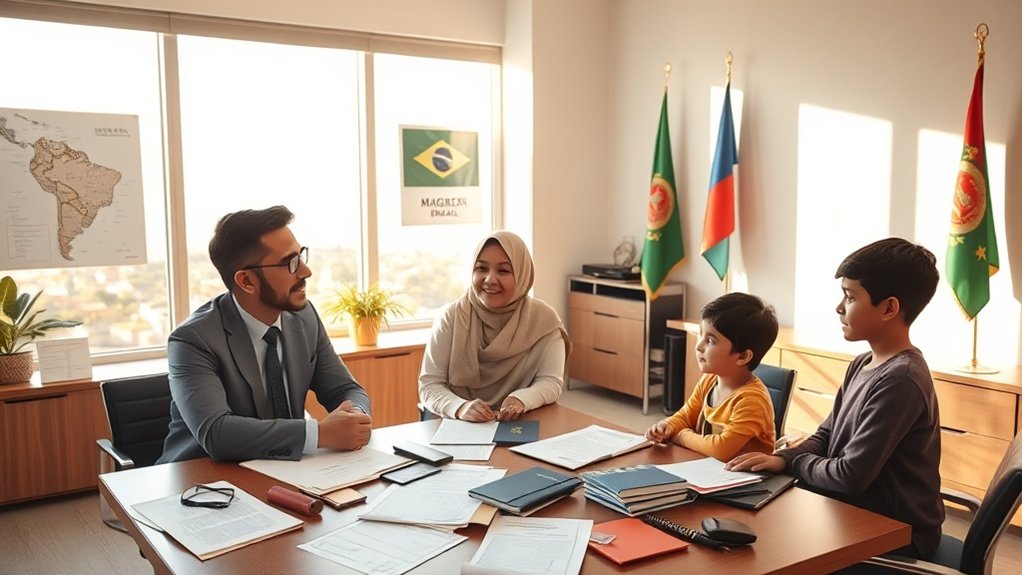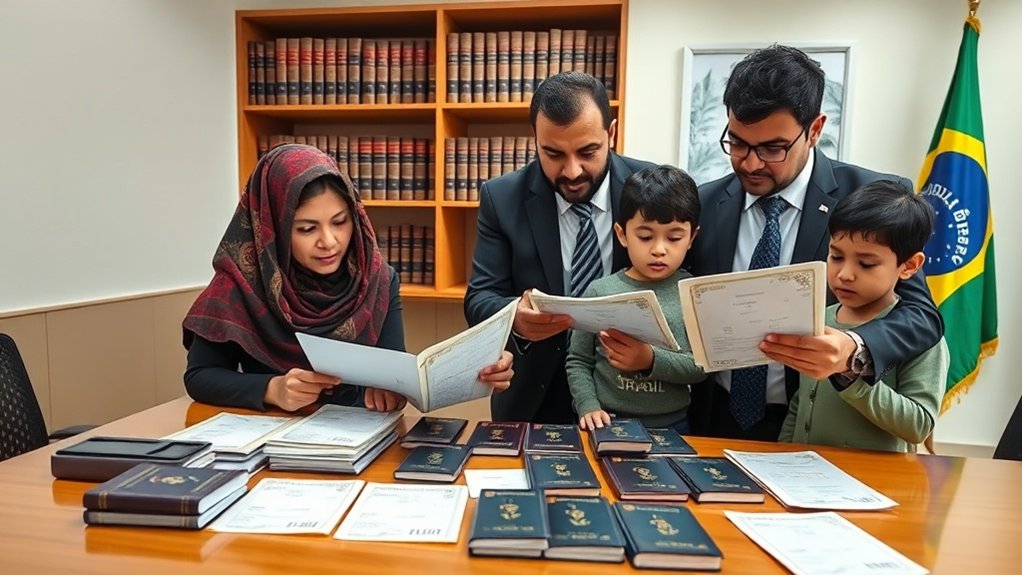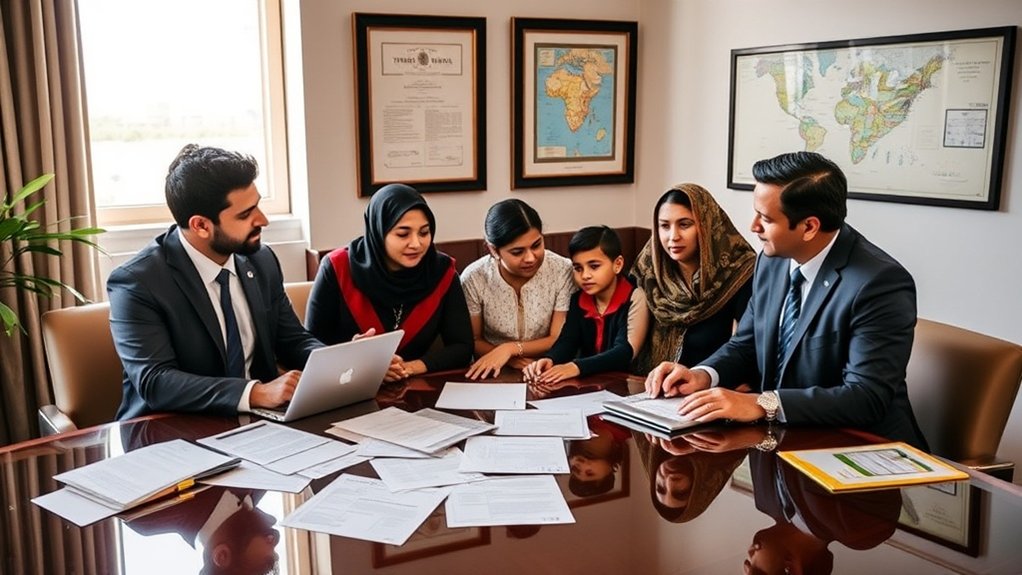If you’re trying to reunite with family in Brazil as an Afghan national, you’ll quickly see how complex migration rules can be. The process involves strict legal steps, detailed paperwork, and unfamiliar deadlines. That’s where Vieira Braga Advogados comes in, guiding you through each requirement so you don’t have to manage everything alone. Wondering how legal experts make this process manageable for Afghan families? There’s more to uncover about their unique approach.
Understanding Brazil’s Migration Policies for Afghan Families

Although Brazil is far from Afghanistan, its migration policies provide important opportunities for Afghan families seeking safety and stability. If you’re considering coming to Brazil, you’ll find that the country offers humanitarian visas for Afghans fleeing conflict or persecution. These visas let you and your family enter Brazil legally and apply for residency once you’ve arrived. Brazil’s migration law emphasizes family unity, so you can request reunification for close relatives, including spouses, children, parents, and dependents.
You don’t need to demonstrate financial means or prove deep ties to Brazil. Instead, you must show that you’re under threat or at risk in Afghanistan. Once in Brazil, you may also access services and rights typically available to other legal residents. By following Brazil’s clear rules and processes, you’ll gain a practical path for rebuilding your life together with your family in a safer environment. As you prepare to move, it’s essential to understand the adaptation challenges that many new arrivals face, such as language barriers and adjusting to a new culture, and plan ahead to ease your transition into Brazilian society.
Key Challenges Faced by Afghan Families Seeking Reunification
You’ll face complex documentation requirements that can seem overwhelming right from the start. Even after submitting your papers, you might wait months—sometimes longer—before hearing any news. On top of that, language barriers can make every step much harder to manage. Navigating the process without legal guidance can lead to delays, rejections, or even sanctions due to missing or incorrect documents.
Complex Documentation Requirements
When Afghan families seek reunification in Brazil, they often face the daunting hurdle of complex documentation requirements. You’ll have to gather, translate, and authenticate documents that might not be easy to obtain back home. Lost records, destroyed archives, or inconsistent Afghan government institutions can make this process feel overwhelming. Plus, Brazilian authorities require precise, legally recognized documentation, leaving little room for error.
Here’s a snapshot of the typical documents you may need:
| Required Document | Common Obstacles |
|---|---|
| Birth Certificates | Missing or incomplete records |
| Marriage Certificates | Lack of official translation |
| Passports/ID Cards | Expired or lost in transit |
| Proof of Kinship | Difficulty proving relationships |
Getting all this in order isn’t just time-consuming—it’s emotionally draining. Consulting professionals knowledgeable in judicial and extrajudicial solutions can help overcome these complex hurdles and improve the likelihood of a successful application.
Lengthy Processing Times
Even after you’ve managed to collect the required documents, the wait for family reunification can stretch on for months or even years. Brazil’s migration authorities process a growing number of applications, but the backlog slows everything down. You might feel powerless as weeks go by with little to no updates on your case. These delays can cause immense stress, especially when your loved ones remain in uncertain or unsafe situations abroad. Sometimes, procedural checks or requests for extra documents push your timeline back even further. You need to stay vigilant, checking for notifications and responding promptly. Unfortunately, rapid answers aren’t common, and there’s no guaranteed timeframe for resolution. Patience becomes essential as you navigate this lengthy and often unpredictable processing period to bring your family together. Seeking experienced legal support can help you avoid costly mistakes and improve your chances of success during this challenging process.
Language and Communication Barriers
Long waits and uncertainty are only part of the struggle—direct communication often becomes another obstacle for Afghan families trying to reunite in Brazil. If you don’t speak Portuguese or English, you’ll find it tough to understand official documents, complete applications, or even explain your family’s situation to migration authorities. Even small mistakes due to language misunderstandings can lead to delays or rejections, making the whole process more daunting and stressful.
You might rely on friends, community members, or informal translators, but this route isn’t always reliable or accurate, especially when dealing with legal terms. Without professional interpretation, key information can be missed or misrepresented. You’ll need support to overcome these barriers so you don’t risk having your loved ones’ cases delayed or denied due to communication gaps. That’s why getting advice from a specialized immigration lawyer can help ensure your documents are correct and your case follows proper procedures under Brazilian law.
Legal Pathways for Family Reunification in Brazil
To reunite with your family in Brazil, you’ll need to meet specific eligibility criteria and provide several key documents. It’s important to understand each step of the application process so you can prepare effectively. Seeking specialized legal support from an immigration lawyer can ensure your documentation is complete and compliant with Brazilian immigration laws, increasing your chances of a successful outcome. Let’s break down what you’ll need and how to get started.
Eligibility Criteria for Reunification
While Brazil welcomes Afghan refugees seeking safety and stability, it’s crucial to understand the specific eligibility criteria that apply to family reunification. To qualify, you must have legal residency or recognized refugee status in Brazil. Only certain relatives are eligible—typically a spouse or partner, minor children, parents of minors, or dependent adult children. Brazil requires you to demonstrate a clear family relationship, such as marriage or birth, and prove that the family member seeking reunification depends on or shares close ties with you. Both you and your relative must agree to the reunification process. While humanitarian grounds often influence decisions, you’ll need to ensure compliance with Brazil’s legal requirements before proceeding. By understanding these eligibility criteria, you increase your chances of a successful family reunification process. It’s important to note that navigating Brazilian immigration laws can be complex, and assistance from a specialized lawyer can help you avoid documentation errors and increase your chances of approval.
Required Documentation Overview
Once you’ve confirmed that you and your family meet Brazil’s eligibility criteria, it’s time to gather the correct documents for your application. You’ll need valid passports for each family member, official proof of your family relationship (such as birth or marriage certificates), and a copy of your Brazilian residency permit or humanitarian visa. It’s important to prepare certified translations of any documents not originally in Portuguese, as Brazilian authorities require this. You should also collect updated photographs and any relevant Afghan identification. If applicable, include additional evidence, like proof of financial support or previous cohabitation. Keep each document up to date, clear, and legible. Having these essentials in order ensures your reunification request is compliant and minimizes delays during Brazil’s evaluation of your case. To further minimize errors and improve your application’s chances, it’s advisable to seek professional assistance for guidance on document organization and compliance with Brazilian immigration law.
Application Process Steps
After you’ve compiled all the required documents, you can start the formal application for family reunification in Brazil through the appropriate legal channels. First, submit your application to the Ministry of Justice or Brazilian consulate, depending on your location. You’ll complete the official family reunification form and provide certified copies of your documents. Make sure you’ve translated everything into Portuguese if required.
Next, the authorities review your submission, checking for completeness and accuracy. Missing information can cause delays, so double-check each item before submitting. You may be asked for an interview or further evidence about your relationship.
Once approved, your family member receives authorization to enter Brazil. Lastly, schedule their consular appointment for the visa and prepare for arrival procedures after reunification is granted. Involving immigration lawyers in RJ at any stage of this process can help prevent legal risks, increase the chances of approval, and ensure your application follows current Brazilian regulations.
The Role of Vieira Braga Advogados in the Application Process
Because navigating Brazil’s legal system for family reunification can be overwhelming, Vieira Braga Advogados steps in to simplify the application process for Afghan families. You’ll benefit from their in-depth understanding of Brazilian migration rules and their hands-on approach. From the start, they break down legal jargon into practical steps, so you won’t get lost in paperwork or regulations. Their team helps you fill out forms accurately, ensures compliance with deadlines, and communicates with authorities on your behalf.
You’ll appreciate how they anticipate potential challenges early and resolve issues before they escalate. They maintain open communication, keeping you informed at every stage, so you’re never uncertain about your case’s progress. Instead of facing bureaucracy alone, you’ll have seasoned advocates guiding you through each phase. Ultimately, Vieira Braga Advogados ensures your family reunification journey runs as smoothly as possible, reducing stress and increasing your chance of a positive outcome. With their guidance, you also minimize risks of application errors and costly delays, which can make a crucial difference in the success of your immigration process.
Essential Documentation for Afghan Family Members

Before your family can begin the reunification process in Brazil, you’ll need to gather specific documents that meet the country’s legal requirements. First, ensure all family members have valid passports. If there are minors, collect birth certificates to prove family relationships. You’ll also need marriage certificates for spouses, plus any legal adoption records if applicable. These documents must be officially translated into Portuguese and authenticated, either by an apostille or the Brazilian consular authority in your country.
Gather proof of your legal status in Brazil, such as your residency permit or protocol document. Submission of recent photographs, proof of income, and a residence address in Brazil will strengthen your application. Keep in mind that discrepancies or missing documents can cause significant delays. Prepare notarized copies of every document, as Brazilian authorities won’t accept originals. By assembling the right documentation, you’re setting a solid foundation for a smoother reunification process for your loved ones.
Humanitarian Visas and Special Protections for Afghans
While navigating family reunification in Brazil, you’ll find that the country offers humanitarian visas and special protections specifically for Afghans facing displacement or danger. Brazil recognizes the extraordinary risks many Afghans currently experience, and its migration rules provide streamlined pathways to safety and stability. If you’re seeking to reunite with loved ones, humanitarian visas allow you and your family to enter Brazil even if you lack traditional travel documents. These visas grant you temporary residence, and, in many cases, access to essential services.
Here’s what you need to know about humanitarian visas and protections:
- Eligibility: You’ll qualify if you can demonstrate a genuine risk of harm or persecution in Afghanistan.
- Application Process: Submit your request at a Brazilian embassy or consulate. Include proof of identity and documents that confirm your risks.
- Special Protections: Once approved, you receive rights such as access to education, health care, and possible pathways to long-term residence.
Common Hurdles and How the Law Firm Overcomes Them

Even with Brazil’s supportive policies, you’ll likely encounter several obstacles during the family reunification process. Language barriers, complex documentation, and long wait times are just a few examples. If you’re facing unclear instructions from Brazilian authorities, or uncertainty about which documents you need from Afghanistan, it can be overwhelming. Here’s a snapshot of typical challenges and how Vieira Braga Advogados helps you overcome them:
| Hurdle | How the Law Firm Helps |
|---|---|
| Language Difficulties | Provides certified translation support |
| Missing Documentation | Guides document collection and validation |
| Delays and Bureaucracy | Proactively manages case follow-ups |
| Unclear Requirements | Clarifies legal obligations and explains next steps |
Vieira Braga Advogados works closely with you and your family, breaking down legal jargon and giving you clear answers at every stage. They proactively communicate with immigration officials and use their experience to resolve paperwork issues efficiently, ensuring your reunification process stays on track.
Success Stories of Afghan Families Supported by Vieira Braga Advogados
Determination often shapes the journey of Afghan families seeking safety and belonging in Brazil. When you turn to Vieira Braga Advogados, you’re not just hiring a law firm—you’re gaining a team that makes family reunification real and achievable. The stories of Afghan families they’ve assisted show exactly how effective tailored legal strategies can be in the face of bureaucracy and uncertainty.
Here are three concrete outcomes families have experienced with their support:
- Swift Visa Approvals: With expert guidance, some families received visas in record time, minimizing painful separation.
- Reunification Despite Complexities: Even cases involving different cities, lost documents, or urgent humanitarian needs saw successful reunions.
- Legal Status Regularization: Families gained not just entry, but also reliable paths to residency and stability in Brazil.
These successes highlight that with expert advocacy, your family too can overcome seemingly insurmountable obstacles.
Next Steps for Afghan Families Wishing to Reunite in Brazil

These success stories show that reunification is possible, but achieving it takes initiative and a clear understanding of the process. If you’re looking to reunite your Afghan family in Brazil, start by gathering all necessary documents, such as identification, proof of relationship, and travel papers. Understand Brazil’s humanitarian visa options, as these are often the legal pathway for families fleeing conflict.
Next, consult a specialized immigration lawyer like Vieira Braga Advogados to review your eligibility and prepare your application. They’ll help you submit accurate forms and avoid costly mistakes. Stay in close communication with Brazilian authorities and continually monitor your application’s status.
Don’t hesitate to seek updates or clarify requirements—they can change, and missing information can delay approval. Finally, prepare your family for travel by understanding Brazil’s entry protocols and support options upon arrival. Taking these steps will give your family the best chance for a successful reunion in Brazil.
Frequently Asked Questions
How Much Does the Legal Assistance From Vieira Braga Advogados Cost?
You’ll find that the cost of legal assistance can vary depending on the complexity of your case and the specific services you need. Usually, lawyers provide an initial consultation, sometimes at a fixed fee, then charge hourly rates or flat fees for full representation. It’s best to contact the firm directly to discuss your situation and receive a detailed quote. Don’t hesitate to ask about payment plans or available options.
Are Interpreter Services Provided During the Reunification Process?
Yes, you can expect interpreter services to be available during the reunification process. Communication is essential, so interpreters help ensure you fully understand each step and requirement. You won’t need to worry if you’re not fluent in Portuguese because interpreters bridge that gap. Whenever you attend interviews or need to provide documents, qualified professionals are typically on hand to assist you, making the process smoother and less stressful.
How Long Does the Entire Reunification Process Usually Take?
You should expect the entire family reunification process to take several months, typically around six to twelve months, depending on your case’s complexity and the workload of immigration authorities. If there are extra requirements or document reviews, it could take longer. You’ll need to ensure you submit all necessary documents correctly and stay in close contact with the authorities to avoid unnecessary delays. Processing times can vary, so it’s crucial to plan accordingly.
Can Vieira Braga Advogados Help With Housing or Employment After Arrival?
Yes, you can expect support with housing and employment after arrival. While they primarily focus on legal aspects of your reunification process, they often guide you to local resources, connections, and organizations specializing in helping newcomers settle in Brazil. You won’t get direct job placements or guaranteed housing, but you’ll receive important advice and referrals, making it much easier to start your new life and integrate smoothly into your community.
What Happens if an Application Is Denied?
If your application is denied, you’ll receive a notice explaining the reasons for the decision. You have the right to appeal, so don’t lose hope—you can challenge the decision within the timeframe set out in the notice. Gather any additional documents or evidence that support your case and submit them with your appeal. Meanwhile, stay in contact with the authorities and follow any instructions provided to avoid complications during the appeal process.
Conclusion
If you’re seeking to reunite your Afghan family in Brazil, Vieira Braga Advogados stands ready to guide you through every legal step. They’ll simplify complex procedures, help you gather documents, and ensure your application meets all requirements. With their support, you’ll face fewer obstacles and have peace of mind knowing experts are advocating for your family’s future. Reach out now and take the first step toward building a new life together in Brazil.



